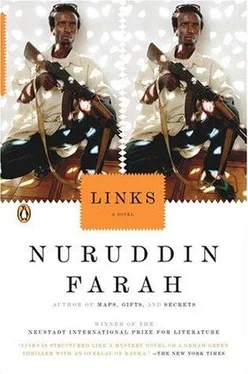At long last, Dirir and Xabbad came face to face. And Dirir threw a daandaansi gauntlet in the wicked ruler’s direction, insisting that he remove the boulders that he and his men had put in the way of nomads who wanted to water their beasts from the wells.
“And if I refuse, what will you do?” came the bad giant’s fierce challenge.
“Then you leave me no choice but to destroy you,” responded the good giant. “I cannot stand by and hear about you looting the camels belonging to others, killing many innocent people.”
BILE WAS DRESSED, BUT NOT READY TO FACE THE DAY. HE SAT AT HIS DESK, which was pushed into a corner. Close to his right hand were three telephones, each linked to one of the city’s networks. There was a fax machine, and two mobile phones.
He thought back to a conversation he had had years before with Seamus and Jeebleh. For some three years, they had lived together in an apartment in Padua, in Italy. He couldn’t remember which of them had described their friendship as “a country — spacious, giving, and generous.” They held no secrets from one another, and lived out of one another’s pockets, sharing all.
At the time, Jeebleh was doing his dissertation on Dante’s Inferno, casting the epic into a poetic idiom comprehensible to a Somali; Bile was studying medicine; and Seamus was working on a postgraduate degree in Italian. Who would’ve thought that the three of them had discussed even then what Somalia would be like if the country plunged into anarchy? Reflecting on the Inferno made Bile shift to the recent past, and a conversation from a week before, when he had taken Seamus to the airport. They were, perhaps unsurprisingly, discussing hell.
Seamus was arguing that hell was a state of mind, not a place with its own territoriality, where the perpetrators of evil were condemned to serve an afterlife of punishments. Bile had reminded his Irish friend that in the Koran, the word for “hell” was specifically derived from “fire.” And he had quoted the Prophet, who, when asked to qualify the relationship between “hell” and “fire,” explained that the former was “more than the fires of the world by sixty-nine parts, every part of which is equal to all the fires of the world!” A sinner experiencing hell would feel as though he were wearing shoes or thongs made of fire, as though the brain in his head were melting. “It’s like being thrown into a boiling copper furnace!” Bile said. Not quite sure of his facts, Seamus wondered whether the Arabic word for “hell” was not based on the Jewish concept Gehenna. To which Bile responded that, according to the Koran, Gehenna “is the purgatorial hell through whose gates all Muslims pass.”
Seamus countered with an Irish fable. A blacksmith deep in debt sells his soul to Satan in exchange for wealth. There is one proviso, however: he’ll lose everything and die if he doesn’t repay the loan in seven years. When the allotted time is up, Satan presents himself before the blacksmith to remind him of their contract. The blacksmith pleads for an extension, which is granted. At the end of this period, he pleads for more time, and again his request is granted. But when he asks for a third extension, Satan will not oblige. He takes possession of the man’s soul. And the blacksmith dies.
The dead blacksmith comes to the gates of heaven, where he meets Saint Peter, who reminds him that because he has sold his soul to the devil in exchange for wealth, he is not welcome. With no other choice, the blacksmith goes to the gates of hell. There, the devil gleefully informs the unhappy fellow that he is not welcome in hell either. When he learns that no amount of pleading will help, he asks Satan, “But where am I to go, then? Where can someone like me go, a man with no soul, no wealth, no power, and no friends to intercede on his behalf?”
“Make your own hell!” Satan tells him.
And so, Seamus concluded, “hell is a warlord who’s ransomed his soul to Satan, in exchange for elusive power.” Then he got on a plane bound for Dublin, leaving Bile alone in Mogadiscio.
THREE OF THE TELEPHONES ON BILE’S DESK STARTED RINGING SIMULTANEOUSLY, though not in any coordinated manner, because the phone companies were owned by subsidiaries of companies based in the United States, Norway, and Malaysia, and the tones they used were different. He didn’t like to answer telephones at random. Then all three phones stopped ringing, only for one to resume after a brief pause. Bile picked it up, because he knew from the code that Dajaal, his man Friday, would be at the other end of the line.
Dajaal asked, “Is there any errand you would like me to run before I see you in half an hour?”
“Yes,” said Bile. “I’d like you to pick up my friend Jeebleh from his hotel, and to bring him here. In fact, I’d appreciate it if you came here first, so I can give you a note for him, just in case you don’t find him there. I want him to know that I’d like to see him right away.”
Dajaal asked, “Do I go armed or unarmed?”
Bile did not answer immediately, because one of the phones had resumed ringing. Then he reminded himself that this was the first time Dajaal had put such a question to him, though he had offered to serve as Bile’s hit man, when word circulated that men allied to an illicit group with links to Mogadiscio’s underworld had kidnapped Raasta. Dajaal knew what was what, but Bile was a man of peace; he would not countenance such a heinous thought. Carrying a firearm was contrary to everything Bile held dear, anathema to his professional ethics as a doctor. “I would prefer for you to go unarmed. And in any case, I would like you to bring my friend Jeebleh here unharmed!”
He hung up, and let the other phone ring and ring and ring. He enjoyed an inner calm, as he thought about meeting Jeebleh, hugging and welcoming him warmly.
JEEBLEH SLEPT A TROUBLED SLEEP.
He dreamt of taking part in fierce clan fighting. He was serving as an auxiliary to Caloosha, who, as commander, saw to the deadly operation. Caloosha was at the wheel of the battlewagon. Trained as an attack animal, Jeebleh took pure delight in the killing spree: happy to be on such a savage mission, in which no prisoners were taken, and in which women were first disemboweled and emptied of their babies, then raped.
A rocket from a bazooka flew over their heads, hitting no one; then heavy machine guns went wild. A missile struck the battlewagon, severing it into two uneven halves. Caloosha and Jeebleh remained in the front of the battlewagon and drove off, separated from the fighters.
The two were in a jubilant mood, singing praises in honor of their common ancestor. Jeebleh wore a belt of bullets, and held a recently fired assault rifle close to his chest, hugging it as one might hug a baby. His fingers came into contact with the bloodied bayonet, as though testing its sharpness. It felt as dull as a dead tooth.
UPON WAKING, JEEBLEH WAS CONSCIOUS OF SHUFFLING MOVEMENTS, SOURCE unknown. He was bothered that he couldn’t tell whether he was still in the Faustian country of his nightmare, a recruit fighting savagely to prove his worth to the clan family, or whether he was awake and hearing living sounds, of which he would eventually make sense.
It took him a long time to identify the source of the noise: a chameleon that was making its way along the floor of his room. What business did a chameleon have with him, up in his room on the second floor? Chameleons had terrified him as a child. Had someone who knew that brought it and deposited it on his balcony, while he was sleeping? Jeebleh doubted that the reptile could have covered such a distance by itself. So who was playing a prank on him, and for what purpose?
In an instant of utter insanity bodied forth by an odd mix of fear and superstition, he got down on the floor and, supporting himself on his elbow, eyeballed his saurian visitor. He watched the reptile’s effete efforts as it headed for him, its one-step-forward, half-a-step-back movement holding Jeebleh under its spell. He sensed an inner tremor as he recalled the atavistic fears Africans had for chameleons, which were believed to have carried the message of death from the heavens. A number of African myths centered death on two oral messages, the one given to a hare and guaranteeing uninterrupted life, the other to a chameleon and presaging mortality. In the myths, the chameleon delivered the message, in obedience to an ancient dark fear. The hare, however, was distracted by its playfulness and failed to pass on the message of life.
Читать дальше












